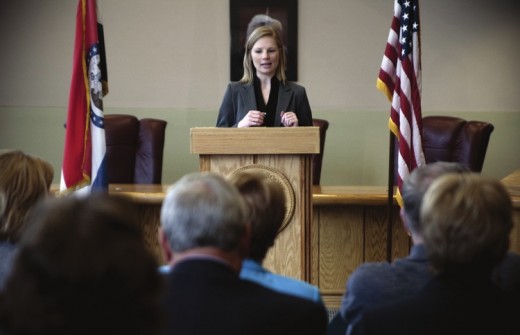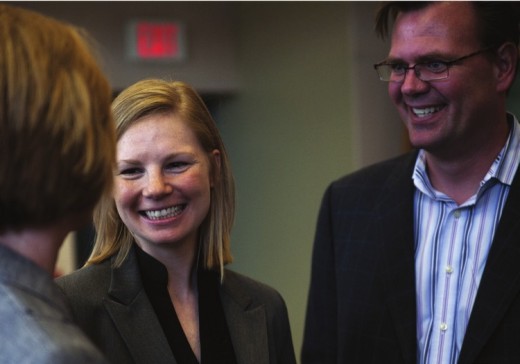New treasurer outlines experience, main challenge
Nicole Galloway started work as Boone County’s treasurer on April 25 after being sworn in the previous Friday. Gov. Jay Nixon appointed Galloway to the office, which became vacant when Janice Fugit died in February, and is up for election in 2012.
Galloway, a Democrat, was raised in Fenton outside St. Louis and earned bachelor’s degrees in applied mathematics and economics from Missouri University of Science and Technology in Rolla.
After working as an actuary for Allstate Corp. in suburban Chicago, Galloway came to Columbia and earned a master’s degree in business administration with an emphasis in accounting from MU’s College of Business.
Galloway, 28, passed the exam to become a certified public accountant and returned to work as an auditor for Brown Smith Wallace LCC in Creve Coeur. Galloway audited financial statements of insurance and re-insurance companies for a year and a half.
She was a corporate auditor for Shelter Insurance Companies in Columbia for the past 10 months. She met Jon Galloway during her first month at MU, and they were married soon after they graduated. Jon Galloway, a Jefferson City native, is the director of communications and policy for Missouri Treasurer Clint Zweifel. They live in the Old Southwest area of Columbia.

To get perspective on the work ahead, Galloway said she plans to meet next week with Kay Murray, who was the county treasurer for three decades.
Shortly before accepting the appointment, Galloway said she read a column in the CBT that Murray wrote a month after her retirement in February 2010.
Galloway said she was particularly stuck by Murray’s recollection that the outgoing treasurer, Maurice Dysart, told her when she announced her candidacy in 1976 that a woman could never win election for treasurer or do the job if elected. Murray went on to win, as did the only other woman on the ballot, Ellen Roper, who was running for probate judge. “I just love that she proved him wrong for 30 years,” Galloway said.
Galloway’s temporary appointment ends after the November 2012 election, and she said, “I have full intentions of running.”
What are the biggest challenges of this position, particularly now with the economy still struggling:
Galloway: Probably the most obvious challenge, which I know is at the forefront of many people’s minds, is the economy. Part of my job is to earn a return on investments for the taxpayers. With interest rates being low, that will probably be the biggest challenge: balancing investments that are secure and are also going to bring a return.
Why did you decide to take the appointment?
Galloway: When this opportunity came forward, I felt like my past educational and work experiences have all come together to prepare me for this role. It’s really intriguing me to use the skills that I have developed and apply them to public service.

Galloway: When I worked as an actuary at Allstate, a lot of what we looked at was the economic impact. We looked at the big picture: how financial transactions will affect business. The majority of assets that an insurance company holds are investments, so getting exposed to so many accounting systems, portfolios and investment policies as an auditor will help me in this position.
How would the skills apply to the demands of the job of county treasurer?
Galloway: Working in public accounting is demanding; you have to learn things quickly and use your prior knowledge and apply it to new situations. What you learn from one client — processes, investment policies they have implemented — might or might not apply to another client in a totally different situation.
The difference between public accounting and being a corporate auditor is the client you work for. Being a corporate auditor, all the departments in that company are your clients, and you have a similar goal. I reviewed data and operational processes to determine whether there was risk of financial loss, any exposure to financial loss, if there might be any violations of laws or regulations or any deviations from company policy.
Are you anticipating a different cultural environment by working in the public sector?
Galloway: I’m a public figure, and that’s a change. Will everyone recognize me on the street? No, but someone might. Because of my other roles, a lot will transfer. Working as an auditor, other companies were my clients. Working as an internal auditor, all of your co-workers in different departments are your clients; it’s your job to serve them. Now, I’m in the role where the taxpayers are my clients, so it’s not that much of a stretch for me that I need to do what’s best for my client — what’s best for taxpayers.


